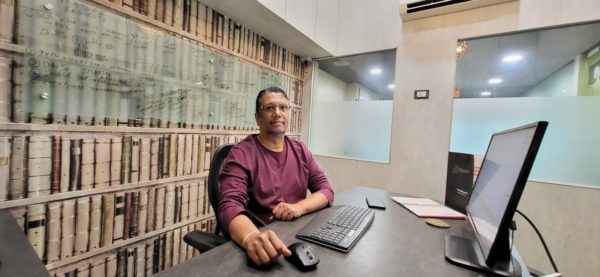– By Tanisha Saxena
In the rapidly evolving world of business automation, HostBooks Ltd. has emerged as a formidable player, offering cutting-edge ERP and CRM solutions tailored to a diverse range of industries. Spearheading its development and innovation is Biswajit Mishra, the Co-Founder and Chief Development Officer. With a distinguished background spanning finance, technology, and strategic management, Mishra has been instrumental in transforming HostBooks into a disruptor in its field. In this interview, he shares insights into the company’s innovative approach and his vision for its future.
Q1. The ERP market has grown rapidly in the past few years. From your perspective, what has HostBooks done uniquely over the last four to five years to stand out in the business ecosystem? Could you share any insights into the customization and innovations you’ve introduced?
HostBooks operates differently from traditional ERP systems. We don’t even position ourselves as an ERP. Instead, we define ourselves as a mission-critical business management solution.
Traditional ERP systems like SAP, Oracle, or Microsoft have a fixed methodology that businesses must adapt to. These systems don’t adapt to the unique needs of a business. HostBooks, on the other hand, is highly configurable and flexible. Our philosophy is simple: we mould ourselves to fit the unique processes of a business rather than forcing the business to conform to us. This adaptability has been a key factor in our growth across multiple verticals.
Q2. Could you provide a specific example to illustrate how HostBooks operates differently compared to a typical ERP system?
Take manufacturing, for instance. Traditional ERP systems often impose rigid, pre-set processes. For example, they might dictate how raw materials are handled or how production timelines are defined. Businesses must qualify their processes to fit within the software’s framework, which can be limiting.
At HostBooks, we approach this differently. We collaborate with the client to understand their specific workflows—be it inventory management, material procurement, or production. We then tailor our solution to align seamlessly with their unique business model. This collaborative and customized approach sets us apart.
Q3. As someone with extensive experience across IT, finance, and other sectors, what do you foresee as the future of CRM and ERP systems? What trends should we expect by 2025?
The business management solutions segment, which includes ERP and CRM, is often overshadowed by more glamorous areas of tech. However, its importance cannot be overstated. By 2025, I foresee three major trends:
1. Significant Growth and Consolidation: The industry will witness steady growth, along with increased mergers, acquisitions, and even closures as players consolidate.
2. Standardization of Pain Points: Businesses are increasingly identifying common pain points. As a result, processes across industries will become more standardized over time.
3. Integration of Advanced Technologies: Emerging technologies like AI and automation will play a pivotal role in streamlining operations and enhancing user experiences.
Q4. Could you share HostBooks’ expansion plans for the near future? Are there specific sectors you’re focusing on?
HostBooks is currently focusing on four key segments: manufacturing, retail, distribution, and healthcare.
While we’ve already made significant strides in the first three sectors, healthcare is an area we’re now entering. Historically, the healthcare sector has lacked consolidation, but that’s starting to change. We’ve begun initial trials and are observing growing opportunities in this space. However, we believe in making our entry only when we’re fully prepared and can offer a robust, impactful solution.
Q5. The Horeca (Hotel, Restaurant, and Catering) segment appears to be on the brink of a major boom in India. How is HostBooks positioning itself in this space?
Horeca is a vital segment for us, contributing nearly 70% of our revenue today. We’ve been working extensively with some well-known brands in this space, leveraging AI to revolutionize operations.
For instance, we’re developing applications that enhance customer satisfaction, optimize product replenishment, and improve overall operational efficiency. By 2025, we aim to set new benchmarks in this segment, making it a milestone year for HostBooks.
Q6. AI and automation are clearly a focus for you. Can you share specific ways HostBooks is utilizing AI?
While I can’t disclose our complete product roadmap, I can tell you that we’re leveraging AI in areas like customer satisfaction, product acceptance, and inventory replenishment. These are critical touchpoints that can greatly impact a business’s success. We believe AI will play an instrumental role in creating smarter, more responsive solutions for businesses.
Q7. It seems healthcare is another major focus area for the future. Could you elaborate on your plans for this sector?
Healthcare is indeed a significant part of our long-term vision. Historically, the sector has been polarized—dominated either by very large players or small, fragmented entities. Mid-sized businesses have often been overlooked. With increasing consolidation in healthcare, we see tremendous potential to step in and add value.
That said, we prefer a measured approach. We want to ensure we’re offering a truly impactful solution before making any grand announcements. It’s about delivering substance, not just hype.
Q8. That’s a refreshing approach. Lastly, what’s your vision for HostBooks in 2025 and beyond?
Our vision is to be consistent in doing what we do. 2025 will be a milestone year, especially in HoReCa and Healthcare industries, where we’re poised to make a significant impact. By combining innovation, adaptability, and a customer-first approach, we aim to redefine how businesses manage their operations.













